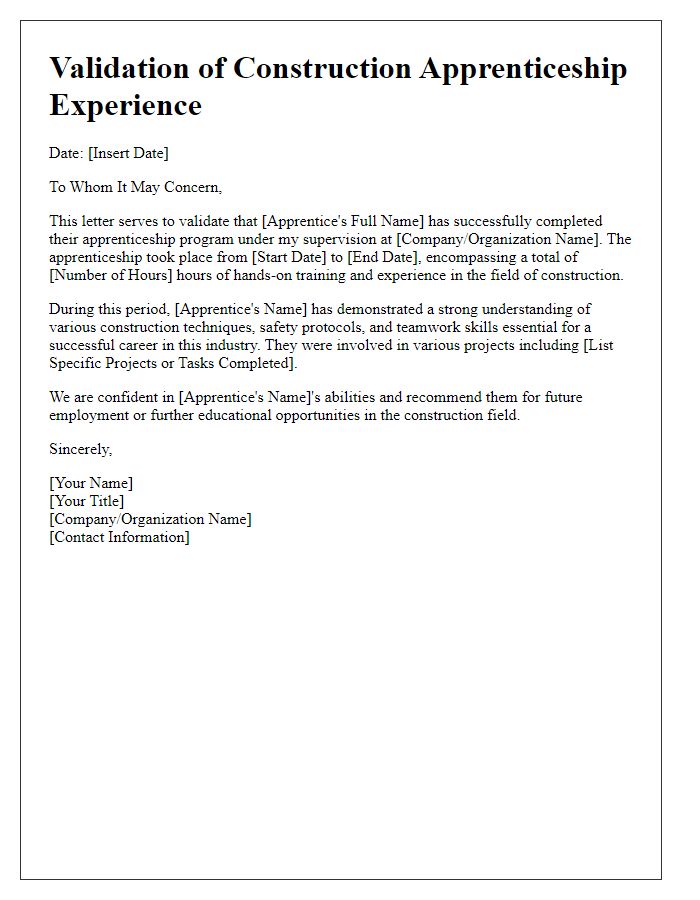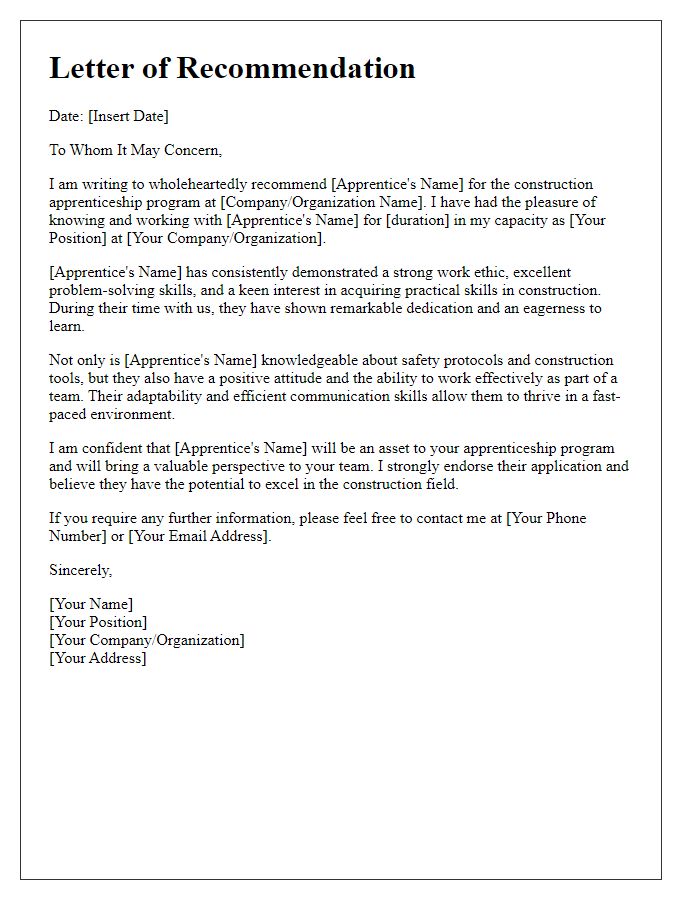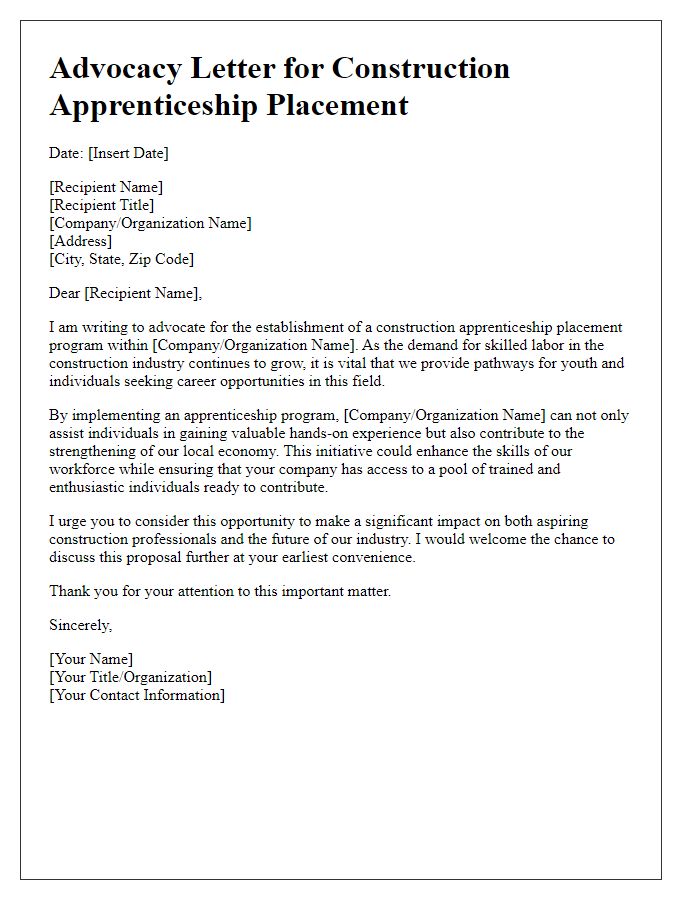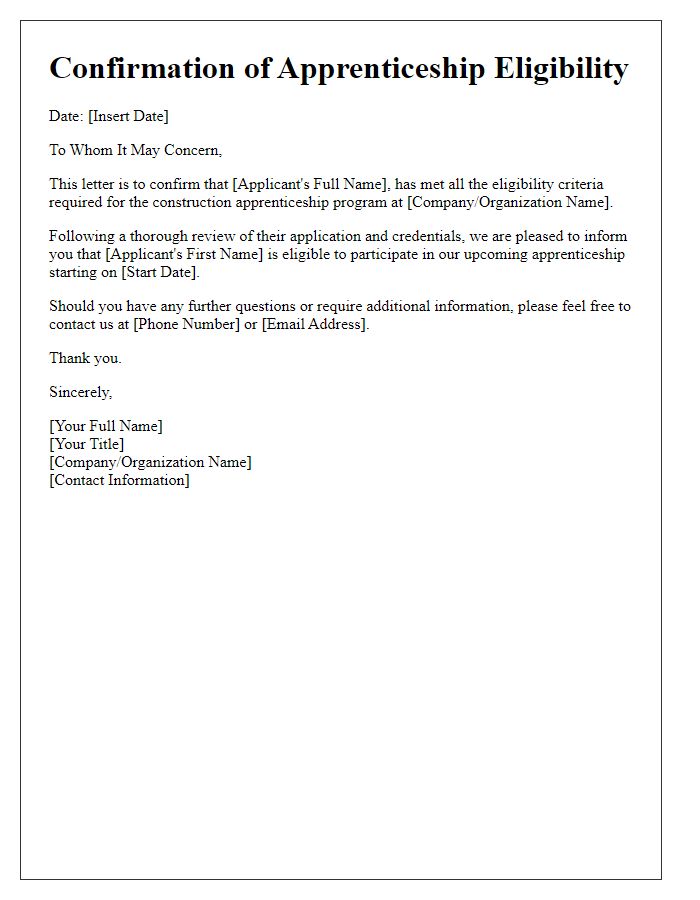Are you looking to kickstart your career in construction but unsure how to impress potential employers? Crafting a strong letter of recommendation can make all the difference in securing that prized apprenticeship position. It highlights not only your skills but also your dedication and work ethic in a field that values hands-on experience. Curious about how to create an impactful reference letter? Read on for tips and templates that can guide you through the process!

Applicant's Skills and Experience
John Smith, a driven individual seeking a construction apprenticeship, has demonstrated exceptional skills in various facets of the construction industry. His proficiency in carpentry, evidenced by completed projects such as a wooden deck installation, showcases a keen eye for detail and structural integrity. With over six months of hands-on experience on a commercial building site in Chicago, Illinois, he has developed strong teamwork capabilities and effective communication skills, essential in a collaborative construction environment. John's familiarity with safety regulations, like those outlined by OSHA (Occupational Safety and Health Administration), ensures a commitment to a safe working atmosphere. Additionally, his problem-solving abilities were highlighted during a recent internship where he efficiently addressed unforeseen challenges during a renovation project, illustrating his adaptability and resourcefulness.
Work Ethic and Reliability
A construction apprenticeship exemplifies the importance of work ethic and reliability in the demanding construction industry. Apprenticeships, typically lasting three to four years, provide hands-on experience paired with classroom instruction, often focusing on essential skills such as concrete pouring, framing, and electrical system installation. Reliability, a key trait in this field, encompasses punctuality, consistent attendance, and adherence to safety protocols, which are vital on job sites across urban areas like New York City and Los Angeles. A strong work ethic not only fosters teamwork among skilled tradespeople but also builds trust with supervisors and clients, demonstrating dedication to completing projects on time, often under tight deadlines, while maintaining quality craftsmanship. Examples of successful apprenticeships highlight individuals who have transformed theoretical knowledge gained from training programs or trade schools, such as the National Center for Construction Education and Research, into practical skills that drive project success and enhance overall workplace morale.
Technical Abilities
A construction apprenticeship requires a solid foundation of technical abilities that encompass various skills essential for effective project execution. Proficiency in reading blueprints, which are detailed architectural plans that guide construction processes, is crucial for understanding project specifications. Familiarity with construction materials, such as reinforced concrete, steel beams, and plywood, enables apprentices to make informed decisions about resource selections and applications. Additionally, hands-on skills in operating tools, including power drills and circular saws, contribute to efficient labor on site. Knowledge of safety protocols, reinforced by guidelines from the Occupational Safety and Health Administration (OSHA), ensures a secure working environment while minimizing accidents. Moreover, the ability to collaborate with skilled tradespeople, from electricians to plumbers, fosters teamwork, helping to synchronize various aspects of a construction project. Overall, a strong technical foundation equips construction apprentices to thrive in dynamic environments where precision and safety are paramount.
Team Collaboration
Effective team collaboration in construction apprenticeships is essential for project success and skill development. Apprentices like those at XYZ Construction Company engage in collaborative tasks that require seamless communication and precise coordination. Skill sets such as carpentry and electrical work involve teamwork on diverse projects, including residential buildings and commercial structures. In dynamic environments like construction sites in Seattle, Washington, apprentices learn to navigate challenges by working closely with experienced tradespeople. Regular safety meetings, typically held bi-weekly, foster a culture of support and shared responsibility, ensuring that every team member, from foremen to apprentices, contributes to a safe and productive work atmosphere. Strong collaboration skills not only enhance individual learning experiences but also lead to high-quality workmanship and timely project completion.
Recommendations and Endorsements
Construction apprenticeships provide invaluable hands-on experience for individuals seeking careers in the construction industry. Participants engage in a variety of tasks, including masonry, plumbing, electrical work, and carpentry, often under the guidance of seasoned professionals. The rigorous training typically spans several years, enabling apprentices to understand industry standards, safety regulations, and technical skills. Successful apprenticeship programs, such as those recognized by the National Center for Construction Education and Research (NCCER), focus on both practical skills and classroom instruction, equipping apprentices for diverse roles. Employers often value references and endorsements from previous trainers, highlighting the apprentice's work ethic, reliability, and ability to collaborate effectively with diverse teams on various job sites.
Letter Template For Construction Apprenticeship Reference Samples
Letter template of validation for construction apprenticeship experience

Letter template of appreciation for construction apprenticeship involvement












Comments